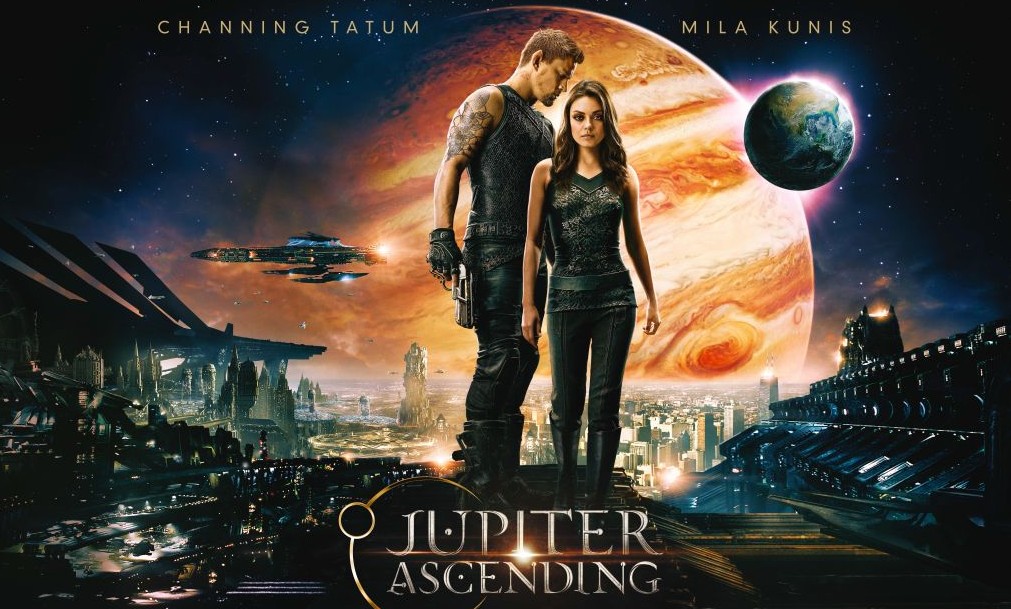A charming film with an incomprehensible plot
Director: Andy and Lana Wachowski
Starring: Channing Tatum, Mila Kunis, Eddie Redmayne, Douglas Booth, Sean Bean, Tuppence Middleton
Running time: 127 mins
Certificate: 12A
Precocious teens entranced by The Matrix in the late 90’s have become the hard-to-please, nostalgic film critics of today. The Wachowski’s blend of cool action and philosophical ideas was a breath of fresh air for mainstream cinema, creating legions of hard-core fans interested in future endeavours. Since the marquee trilogy, the brother’s film output has been intermittent. Offerings like Speed Racer indicate that they’re not afraid to address a young audience. Contextually, then, Jupiter Ascending was bound to raise eyebrows. Expectations for an ambitious 12A space opera are unrealistically set. Nostalgia unsated is a recipe for resentment.
Jupiter Ascending’s plot revolves around Jupiter Jones (portrayed by the ever charismatic Mila Kunis), a Russian cleaner with astrological aspirations and a clandestine destiny. After an attempt on her life, Jupiter is warned by a genetically modified warrior, Caine Wise (played by Channing Tatum), that she’s to play a pivotal part in the fate of the universe. Jupiter has a birthright to command the aristocratic echelons of a humanoid race, hell bent on populating planets – including Earth – as a means to ‘farm’ them for their time and energy.
The film harbours a thinly veiled Marxist critique. Such is the undercurrent hysteria, that it projects these political concerns beyond mother earth. Maximisation of profit becomes the dreaded axiomatic certainty, the nightmare end-game for the left leaning. What could be worse than a band of monarchical turbo capitalists maintaining a vampire-like stranglehold on sentient life – even securing the services of alien races? Jupiter Ascending doesn’t eschew previous themes found in the Wachowski’s work; it just superficially skirts around them. Jupiter, like Neo, is the chosen one, a Christ-like redeemer. For her life to work in both worlds, furtive conspiracy must persist, otherwise proverbial heads will roll. The outside of Plato’s cave is as real as the glitches of the matrix, or the mega ships orbiting and orchestrating Jupiter Jones’ earth.
The narrative, bemusing at times, feels choppy, as if a good third of the film was discarded on the cutting room floor. Although the action scenes are visually impressive and thrilling, they take up a lot of time, leaving the audience with mere morsels of rushed exposition. Because of this, the more interesting themes are jettisoned sharply, left in the dust by a plot urgent to transition to the next flashy scene, reducing the Wachowski’s socio-political commentary to sound bites. Unfortunately, a lot of the film is filler. The lead romance feels lifeless and tacked on. Tatum’s stoic persona ‘shines’ through, completely freezing over any chemistry he and Kunis might have. Scenes involving Mila’s earthbound family are largely superfluous too. The dated caricatures that make up her family inspire few laughs and feels out of place.
Jupiter Ascending has a tendency to provoke both intentional and unintentional laughs. Plot holes will leave the more discerning viewer either chuckling or confused. Eddie Redmayne, playing the principle antagonistic, Balem, hams it up to the ninth degree. If he’s not emitting strained, almost constipated whispers, he’s breaking into public school boy tantrums at a whim. Perhaps the funniest scene of the film is a homage to Terry Gilliam’s comedic dystopias: the ones dealing with the mundane aspects of a techno-futuristic bureaucracy. In the scene, a politer than polite camp android starts a series of bureaucratic processes for Jupiter, only for him to short circuit and the façade of his professional role playing slip, as his frustration mounts.
Jupiter Ascending ends as if it is not a stand-alone film but the first part of a new franchise. Yet its anti-climax also signals potential interest – at the very least, curiosity- in the universe it creates. Although flawed, it is ultimately a fun romp that will suffer serious analysis because ultimately it is aimed at young teens. The flash-bang CGI and colourful assortment of backgrounds, characters, costumes, and set designs will entertain the less demanding viewer. It might be haphazard, at times entirely slap dash, but on the occasions that it works, it charms.
Verdict





























